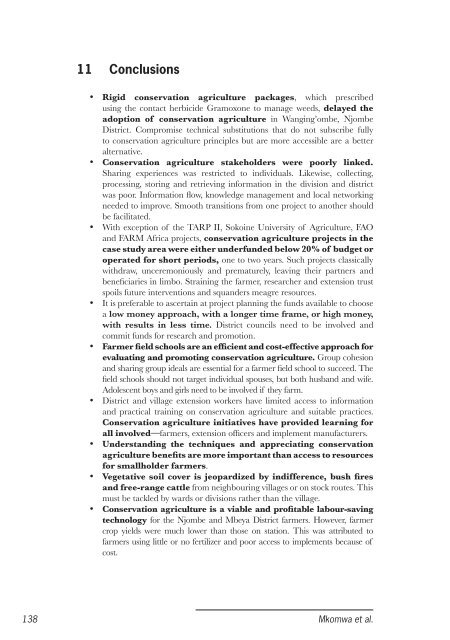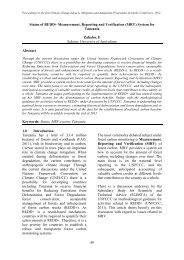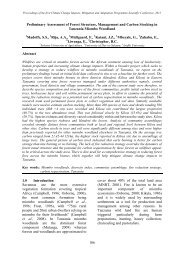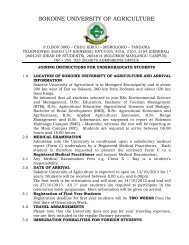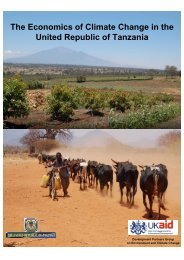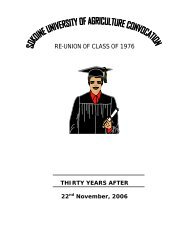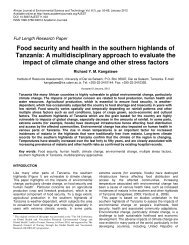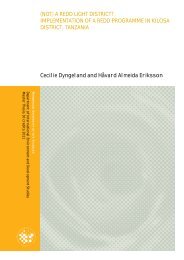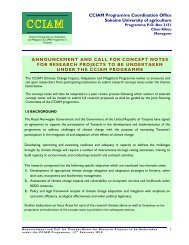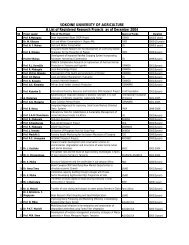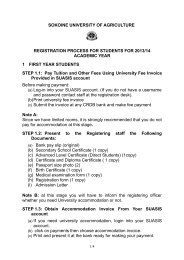Conservation agriculture Tanzania_casestudy.pdf - Sokoine ...
Conservation agriculture Tanzania_casestudy.pdf - Sokoine ...
Conservation agriculture Tanzania_casestudy.pdf - Sokoine ...
- No tags were found...
Create successful ePaper yourself
Turn your PDF publications into a flip-book with our unique Google optimized e-Paper software.
11 Conclusions• Rigid conservation <strong>agriculture</strong> packages, which prescribedusing the contact herbicide Gramoxone to manage weeds, delayed theadoption of conservation <strong>agriculture</strong> in Wanging’ombe, NjombeDistrict. Compromise technical substitutions that do not subscribe fullyto conservation <strong>agriculture</strong> principles but are more accessible are a betteralternative.• <strong>Conservation</strong> <strong>agriculture</strong> stakeholders were poorly linked.Sharing experiences was restricted to individuals. Likewise, collecting,processing, storing and retrieving information in the division and districtwas poor. Information flow, knowledge management and local networkingneeded to improve. Smooth transitions from one project to another shouldbe facilitated.• With exception of the TARP II, <strong>Sokoine</strong> University of Agriculture, FAOand FARM Africa projects, conservation <strong>agriculture</strong> projects in thecase study area were either underfunded below 20% of budget oroperated for short periods, one to two years. Such projects classicallywithdraw, unceremoniously and prematurely, leaving their partners andbeneficiaries in limbo. Straining the farmer, researcher and extension trustspoils future interventions and squanders meagre resources.• It is preferable to ascertain at project planning the funds available to choosea low money approach, with a longer time frame, or high money,with results in less time. District councils need to be involved andcommit funds for research and promotion.• Farmer field schools are an efficient and cost-effective approach forevaluating and promoting conservation <strong>agriculture</strong>. Group cohesionand sharing group ideals are essential for a farmer field school to succeed. Thefield schools should not target individual spouses, but both husband and wife.Adolescent boys and girls need to be involved if they farm.• District and village extension workers have limited access to informationand practical training on conservation <strong>agriculture</strong> and suitable practices.<strong>Conservation</strong> <strong>agriculture</strong> initiatives have provided learning forall involved—farmers, extension officers and implement manufacturers.• Understanding the techniques and appreciating conservation<strong>agriculture</strong> benefits are more important than access to resourcesfor smallholder farmers.• Vegetative soil cover is jeopardized by indifference, bush firesand free-range cattle from neighbouring villages or on stock routes. Thismust be tackled by wards or divisions rather than the village.• <strong>Conservation</strong> <strong>agriculture</strong> is a viable and profitable labour-savingtechnology for the Njombe and Mbeya District farmers. However, farmercrop yields were much lower than those on station. This was attributed tofarmers using little or no fertilizer and poor access to implements because ofcost.138 Mkomwa et al.


